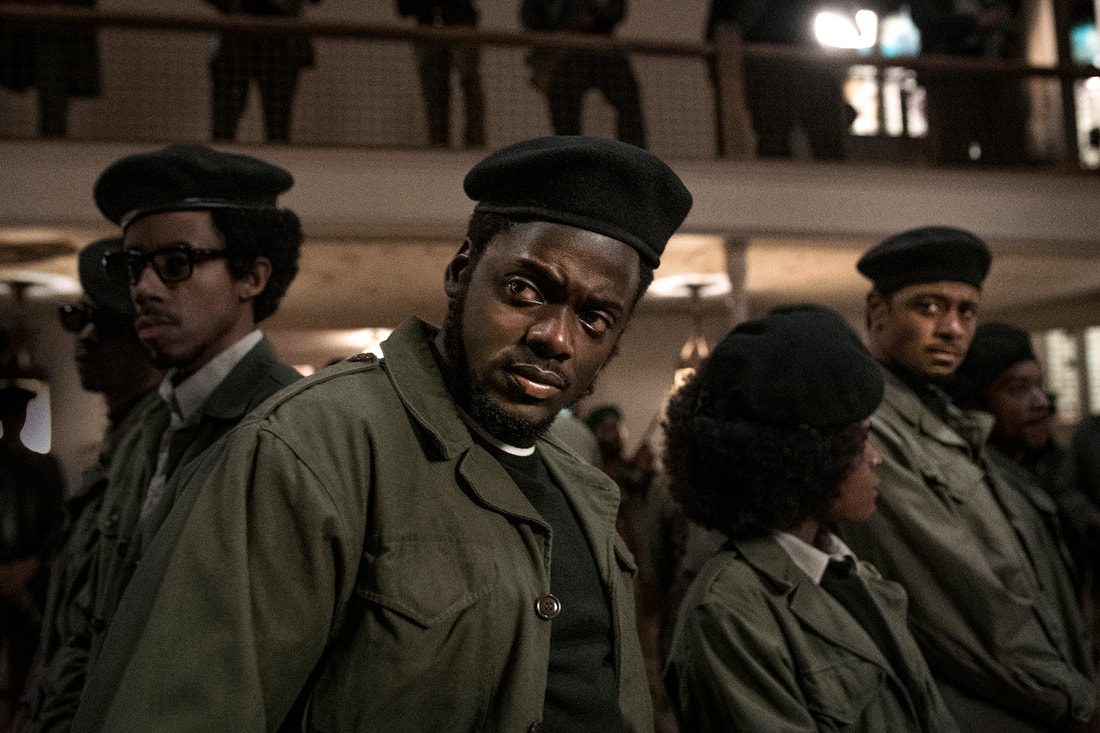Evan D.We need to have a conversation about the Black Panthers. It’s past time really. Coming up through the American school system the extent I heard about the Panthers was J. Edgar Hoover’s infamous assessment of the group. Nary a mention of the children’s breakfast programs they instituted, the medical clinics they ran, the social justice causes for which they advocated. Judas and the Black Messiah may actually be many an American’s first introduction to Fred Hampton, portrayed by Get Out star Daniel Kaluuya. In a capitalistic perversion, Fred Hampton’s first biopic isn’t actually about Fred Hampton explicitly. Rather this is a film on the even lesser known Bill O’Neal (Lakeith Stanfield), the man who got him killed. Hampton’s story is turned from that of a radical activist, architect of revolution, uniter of the oppressed and into one half of an FBI thriller. Fred Hampton, the renowned socialist had his story co-opted to make it more marketable for a studio. This may sound like a criticism of Judas and the Black Messiah — maybe to some degree it is — but in actuality the contrast between Hampton and O’Neal makes for scintillating filmmaking.
Bill is an FBI agent, at least he’s pretending to be one. It’s a great grift to boost cars, “a badge is scarier than a gun” as he puts it. But when the real feds step in things get a bit more complicated. If Chairman Fred is an ideologue through and through, Bill is whatever the exact opposite is. For him Black liberation means nothing more than making it through another day. Faced with the prospect of five years behind bars, Bill jumps at an offer to infiltrate Hampton’s Panthers in exchange for a reduced sentence. If things work out, he might even earn some cash on the side. When O’Neal meets Hampton, at a speech to a Black Student Union in Chicago, he’s out of focus. The chairman is undeniably resonant, an inspiring voice to the maligned Black community he seeks to empower. But to Bill, and really the audience broadly, Hampton eludes definition. As his words bombard the powerful forces oppressing his people, the camera struggles to contain within it’s frame his charisma and dedication. Such concrete moral ideals are inconceivable to a survivalist like Bill. Each scene carries this contrast like weight. A constant juxtaposition between one young man who has felt the deep sting of life without anything, willing to do whatever is asked to claw his way out of poverty, even at the expense of the other, a true ideologue willing to sacrifice his life if it meant more Black folks had a shot at equal footing in this country. This isn’t a dichotomy that escapes Bill’s psyche. Stanfield subtly expresses the guilty hesitation of a man who has traded his soul away in the process of selling out an emerging hero of the Black liberation movement. By Hampton’s last speech that much is clear to us all. Although every bit as passionate and moving as his rally for the Black Student Union, this time Hampton cannot break out of the camera’s frame as he delivers the powerful “I am a Revolutionary” speech. At last Bill see’s Chairman Fred for who he is and perhaps himself for who he isn’t. So perhaps framing Judas and the Black Messiah around Bill’s perspective was actually brilliant. Fred Hampton’s struggle wasn’t one that pitted him against the world, or even against Bill O’Neal for that matter. Rather it was that of the collective against the capitalist, a rainbow coalition of the impoverished against the entrenched powers of White America. Bill versus Fred is the story of America distilled. Bill O’Neal, perhaps a villain in reality, isn’t one in director Shaka King’s telling of this story. Stanfield at the very least won’t let him be. Every action he takes, every tip he reluctantly gives to Jesse Plemons’ FBI agent is accompanied by a hesitancy behind his eyes. Despite every ill guided choice he makes, Bill is nothing more than a pawn of the establishment. Fred, on the other hand, is the moralistic center of the film. Kaluuya, ever charismatic himself, imbues his character with such righteousness. Even if the Chairman isn’t the lead, he is without doubt the hero. This remains true despite King never shying away from the complete package of Hampton. Throughout Judas and the Black Messiah Chairman Fred calls for the killing of police in the same breath that he pleads for the feeding of poor black children on the west side of Chicago. This is the same man who militantly fought for Black liberation but teamed with the confederate tinged Young Patriot Organization. With a frenetic energy, Judas and the Black Messiah pits the forces of capitalism — accompanied by every bit of its governmental backing — against Hampton’s truly socialist movement. You don’t need to see the film to know what wins out, it’s the same force that has won out every time the powerful have waged war against the impoverished. Judas and the Black Messiah may not be the singular biopic we are still lacking of Fred Hampton — or Huey Newton or Bobby Seale for that matter — but it is thus far the definitive documentation of their unceasing struggle. Although the fact that a major studio made this is an indication that a true Panthers biopic is getting closer. Bill O’Neal is front and center because in the course of American history he always has been. This country has consistently put down revolution, yet sold a story of progress as fervently as it has sold goods produced off the backs of exploited labor. Judas and the Black Messiah is not only one of the best movies of the year, it is a critical history you wont see in schools. 9/10
Comments
|
Categories
All
Archives
April 2024
|
